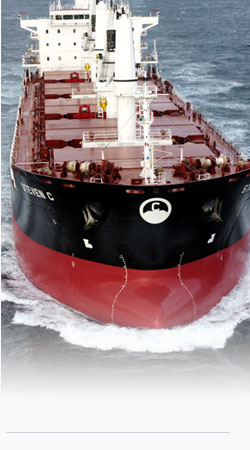Overview
For more than a decade, Apex Bulk Carriers has been a leading international ship owning company. Apex has built a global reputation for providing outstanding levels of safety, reliability, cost efficiency and quality for our charterers. Our competitive rates and business integrity make Apex a vital charter solution for a variety of dry bulk shipments.
An energetic and motivated management team and significant financial strength means that Apex Bulk Carriers is strongly positioned for future growth. The company’s long-term goal is to develop a larger fleet of high-quality vessels to continue to exceed our customers’ expectations.
Our History: A Careful Plan for Growth
Apex Bulk Carriers has worked with a wide range of first-class charterers and operators since 1998, when Apex Marine was acquired by Chairman and CEO John Calicchio. In the subsequent two years, Apex acquired eight previously owned Handymax Dry Bulk Carriers; these vessels were operated successfully for a number of years and were sold when new vessels were contracted. At that time, the company contracted for eight Handysize Dry Bulk Carriers to be built at SPP Shipbuilding in South Korea. Delivery commenced in Fall 2009.
The Future: A Blueprint for Expansion
An energetic and motivated management team and significant financial strength means that Apex Bulk Carriers is strongly positioned for future growth.
The Dry Bulk Industry
Apex Bulk Carriers is a ship-owning company of dry bulk carriers-vessels specially designed to maximize capacity, safety, efficiency, and to be able to withstand the rigors of their work.
Bulk Carriers: A Definition
The International Convention for the Safety of Life at Sea defines a bulk carrier as “a ship constructed with a single deck, top side tanks and hopper side tanks in cargo spaces and intended to primarily carry dry cargo in bulk; an ore carrier; or a combination carrier.” However, most classification societies use a broader definition where a bulker is any ship that carries dry unpackaged goods. The term “dry bulk carrier” is used to distinguish bulkers from bulk liquid carriers such as oil, chemical, or liquefied petroleum gas carriers.
Carrier Segments
Bulk carriers are classified into six major size categories: small, handysize, handymax, panamax, capesize, and very large. Handysize (the segment in which Apex Bulk Carriers operates) and Handymax ships are general purpose in nature. These two segments represent 71% of all bulk carriers over 10,000 DWT and also have the highest rate of growth within the industry.
